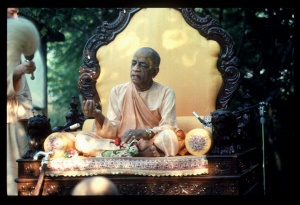BG 18.16: Difference between revisions
m (1 revision(s)) |
(Vanibot #0020 edit - link to the Version Compare feature) |
||
| Line 1: | Line 1: | ||
{{ | [[Category:Bhagavad-gita As It Is (1983+) - Chapter 18]] | ||
<div style="float:left">'''[[Bhagavad-gita As It Is (1983+)]] - [[BG 18 (1983+)|Chapter 18: Conclusion - The Perfection of Renunciation]]'''</div> | |||
<div style="float:right">[[File:Go-previous.png|link=BG 18.15]] '''[[BG 18.15]] - [[BG 18.17]]''' [[File:Go-next.png|link=BG 18.17]]</div> | |||
{{CompareVersions|BG|18.16|BG 1972|BG 1983+}} | |||
{{RandomImage}} | |||
==== TEXT 16 ==== | ==== TEXT 16 ==== | ||
<div class="devanagari"> | |||
:तत्रैवं सति कर्तारमात्मानं केवलं तु यः । | |||
:पश्यत्यकृतबुद्धित्वान्न स पश्यति दुर्मतिः ॥१६॥ | |||
</div> | |||
<div | <div class="verse"> | ||
:tatraivaṁ sati kartāram | |||
:ātmānaṁ kevalaṁ tu yaḥ | |||
:paśyaty akṛta-buddhitvān | |||
:na sa paśyati durmatiḥ | |||
</div> | </div> | ||
==== SYNONYMS ==== | ==== SYNONYMS ==== | ||
<div class="synonyms"> | |||
<div | ''tatra''—there; ''evam''—thus; ''sati''—being; ''kartāram''—the worker; ''ātmānam''—himself; ''kevalam''—only; ''tu''—but; ''yaḥ''—anyone who; ''paśyati''—sees; ''akṛta-buddhitvāt''—due to unintelligence; ''na''—never; ''saḥ''—he; ''paśyati''—sees; ''durmatiḥ''—foolish. | ||
</div> | </div> | ||
==== TRANSLATION ==== | ==== TRANSLATION ==== | ||
<div class="translation"> | |||
<div | |||
Therefore one who thinks himself the only doer, not considering the five factors, is certainly not very intelligent and cannot see things as they are. | Therefore one who thinks himself the only doer, not considering the five factors, is certainly not very intelligent and cannot see things as they are. | ||
</div> | </div> | ||
==== PURPORT ==== | |||
= | <div class="purport"> | ||
A foolish person cannot understand that the Supersoul is sitting as a friend within and conducting his actions. Although the material causes are the place, the worker, the endeavor and the senses, the final cause is the Supreme, the Personality of Godhead. Therefore, one should see not only the four material causes but the supreme efficient cause as well. One who does not see the Supreme thinks himself to be the doer. | |||
</div> | |||
<div | <div style="float:right; clear:both;">[[File:Go-previous.png|link=BG 18.15]] '''[[BG 18.15]] - [[BG 18.17]]''' [[File:Go-next.png|link=BG 18.17]]</div> | ||
__NOTOC__ | |||
</div> | __NOEDITSECTION__ | ||
__NOTOC__ | |||
Revision as of 20:29, 7 December 2017

A.C. Bhaktivedanta Swami Prabhupada
TEXT 16
- तत्रैवं सति कर्तारमात्मानं केवलं तु यः ।
- पश्यत्यकृतबुद्धित्वान्न स पश्यति दुर्मतिः ॥१६॥
- tatraivaṁ sati kartāram
- ātmānaṁ kevalaṁ tu yaḥ
- paśyaty akṛta-buddhitvān
- na sa paśyati durmatiḥ
SYNONYMS
tatra—there; evam—thus; sati—being; kartāram—the worker; ātmānam—himself; kevalam—only; tu—but; yaḥ—anyone who; paśyati—sees; akṛta-buddhitvāt—due to unintelligence; na—never; saḥ—he; paśyati—sees; durmatiḥ—foolish.
TRANSLATION
Therefore one who thinks himself the only doer, not considering the five factors, is certainly not very intelligent and cannot see things as they are.
PURPORT
A foolish person cannot understand that the Supersoul is sitting as a friend within and conducting his actions. Although the material causes are the place, the worker, the endeavor and the senses, the final cause is the Supreme, the Personality of Godhead. Therefore, one should see not only the four material causes but the supreme efficient cause as well. One who does not see the Supreme thinks himself to be the doer.